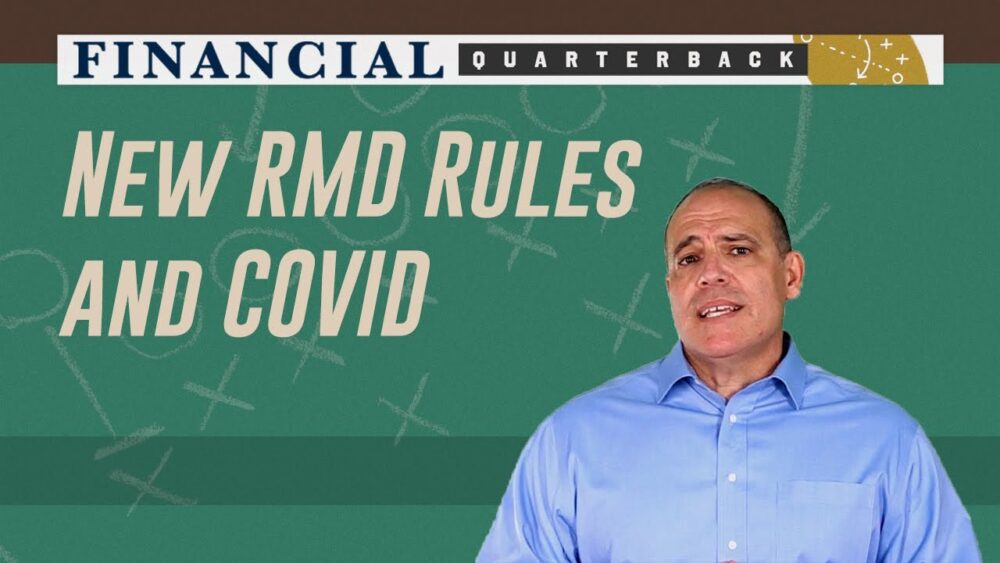This massive piece of legislation was passed as a result of the COVID-19 pandemic. The legislation made significant changes that impact retirees, retirement income strategies, IRAs, income taxes, and qualified retirement plans like 401(k)s, 403(b)s, etc.
One major impact it made was in reference to Required Minimum Distributions (RMD).
The Secure Act passed at the end of 2019 and went into effect on January 1st, 2020. This Act changed the very confusing beginning date for your RMD from age 70 1/2 to 72. (The Act did not change RMDs for anyone who was already receiving their required distributions from their retirement accounts.)
The CARES Act, once again, has made changes to RMDs. Under the new rules for 2020, a provision in the Act suspends all RMDs for 2020 (meaning you don’t have to take them this year). These accounts include 401(k)s, inherited IRAs, 403(b)s, Traditional IRAs, and other similar type of retirement accounts.
The suspension of RMDs for 2020 is extremely beneficial for retirees taking distributions from portfolios invested in the market. With the recent market volatility and uncertainty, all accounts with stock market exposure have seen declines.
Taking distributions from these accounts, especially in retirement, is not a good thing. If the 2020 RMD had not been waived, retirees would have to withdraw a greater percentage from their IRA or plan balance and pay a tax bill on value that no longer exists. So this suspension is a good thing.
That said, the question might be, “Based on this new rule, what are my options?” Here are some things you can do.
1. Take your RMD and keep it.
If you need the income, you can keep your distribution and pay the taxes owed. There is no rule requiring you to not take the distribution. The rule only states that you can waive taking your RMD in 2020.
2. Repay your entire distribution.
If you received your RMD, don’t need it, and don’t want to pay the taxes owed, it’s possible that you can return it to yourself.
There is a permanent rule in the books called the 60-day rollover. This rule states that, within 60 days, you can take a distribution from your retirement account and move it into another retirement account without paying taxes on the distribution. If you are doing this from an IRA, you are limited to one IRA-to-IRA rollover every 12 months.
So, if you received a distribution on or after February 1st, 2020, you have until July 15, 2020, to complete your 60-day rollover. You must make sure you have not already completed a 60-day rollover in the past 12 months. This rollover extension does not apply to beneficiary/inherited IRAs.
If you were affected by COVID-19 in some manner, which has a very broad definition, you may have more than 60 days. We should definitely see additional guidance from the IRS on this issue.
3. Convert It to a Roth.
This is my personal favorite option!
Normally your RMDs cannot be converted into a Roth IRA, but since RMDs are waived this year due to the CARES Act, you can actually take your distribution from your IRA/401(k) (or similar plan) and pay your distribution into your Roth IRA.
There are SEVERAL benefits to doing this:
- Any amount converted into your Roth IRA will not be subject to any future RMDs and will lower your income tax in future years.
- Market values have dropped drastically over the last few months. Removing this money from a taxable environment into a tax-free environment will make all future gains tax-free.
- All funds in Roth IRAs will pass tax-free to your beneficiary.
4. Give It to Charity.
Even though RMDs are waived, you can still get a tax break and give to charity. If you normally give to charity, stop using your RMD income!
Instead, make a Qualified Charitable Distribution (QCD) instead. Using a QCD will directly transfer the funds to a designated charity. This distribution will be excluded from your income entirely. The age to qualify for doing a QCD is still 70 1/2 or older even though the age for RMDs changed to 72. QCDs are a great reason to withdraw money from your IRA, even if you don’t have to.
The bottom line is that for 2020, all RMDs are waived. But he introduction of the CARES Act provides a great opportunity to take advantage of these tax planning opportunities, if you plan it correctly.

